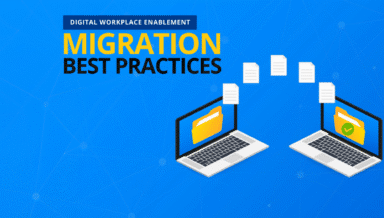Want more in-depth information on migrating to Office 365? Watch our free webinar “Planning for Office 365: Managing Content During Your Migration” for expert advice.
Change is never an easy thing. This is especially true when you’re trying to transfer years’ worth of information to a (possibly) completely different platform. If you’re in the planning phases of this process and have a smaller or less experienced IT team, using Office 365 migration services might be the right move. Read on for four telling signs that your organization would benefit from working with professionals.
1. Your In-House Team Has Never Performed an Office 365 Migration Before
For as user-friendly as Office 365 is on the front-end, there are still quite the number of moving parts that have to be accounted for. Though a mail and calendar-focused application like Exchange might be simple enough to transition to, SharePoint Online and Microsoft Teams (with its countless integrations with other apps in the Office 365 suite) can be significantly more difficult to work with.
Teams without any experience working with cloud apps are sure to run into some hurdles, making your transition that much more trying for everyone involved.

2. You’re Moving from Completely On-Prem to the Cloud for the First Time
Though the idea of working in the cloud isn’t brand new, it’s new enough that your IT team might not have any experience migrating data to it. Making a clean move from on-premises to the cloud might be less complex than moving to a hybrid environment, but there will likely still be significant bumps in the road either way. Your best options? Either heavily train your current team, or hire experts who’ve done it all before.
3. Your Migration is Taking Too Long, Want to Expedite the Process
How long it takes to migrate to Office 365 will largely depend on the size of your organization, how familiar your migration team is with the process, and the volume and types of data you want to move. While there’s no standard timeframe in place—it all varies based on the factors above—data migrations can generally take anywhere from a few weeks to several months or more.
If you want to move as fast as possible, using a service that’s performed thousands of migrations for companies of various sizes is your best bet to move things along.
Think you might need help migrating to Office 365? Check out this post: Click To Tweet4. You’re Having Trouble Agreeing on the Migration Approach Internally
Whether you’re coming from an email-only organization or have been using an alternative platform for your day-to-day communication needs, one thing is certain: there’s more than one way to go about moving your data to Office 365.
Are you in a hurry? A quick lift and shift migration might make the most sense for your deadline. Want to ensure that all of your data is secure and compliant with internal regulations? A slower but more thorough compliant migration would be necessary. Looking for an option that will let you recognize your data without the lengthy wait time of a compliant migration? A strategy that involves basic discovery (which is typically the most popular option with our clients) will fill that need.
If your IT team is struggling to decide which path to take, getting professional input can help steer you in the right direction. Find more in-depth info on each of these migration paths in this blog post.

Start the Move!
Does your organization fall into any of the above categories? If so, consider partnering with AvePoint to bring your business to the cloud as efficiently as possible with minimal impact on your daily workflow. Our cloud migration solution allows you to discover, migrate, and monitor your data throughout the entire process. We also provide detailed reports that’ll show you exactly what we’ve found during the move.
Want to get a consultation? Visit our services page to begin your migration journey!




